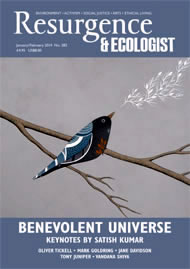The Old Ways is the third in Robert Macfarlane’s loose trilogy inquiring into the human response to landscape. Mountains of the Mind: A History of a Fascination told the story of the changing European response to mountain landscape. The Wild Places was a direct, and at times challenging, exploration of some remaining wild places in the British Isles. The Old Ways is a more literary book, in which Macfarlane walks “holloways, bostles, shutes, driftways, lichways, ridings, halterpaths, cartways, carneys, causeways, herepaths”, sometimes alone and sometimes with others, but always in the company of those many who preceded him and who wrote of their experiences: George Borrow, William Wordsworth, Henry Williamson, Roger Deakin, John Clare, Nan Shepherd and many more; and especially the poet Edward Thomas.
This is a substantial book that covers much territory: Macfarlane walks along the chalk of the Icknield Way and treads warily across the silt of the Broomway off Foulness; he climbs over the gneiss and granite in the Highlands and Islands, and joins a Palestinian friend in “small but repeated acts of civil disobedience” by roaming the countryside of the Occupied Territories; he follows pilgrimage routes in Spain, and ends up traversing the flint of the South Downs where Edward Thomas spent so much of his life. Along the way he meets and talks with artists, writers, sailors, historians; weaves in literary and personal memories; and reflects on the nature of pathways, of walking, of pilgrimage.
Macfarlane is for many the premier Nature writer of our time, and certainly has contributed hugely to the resurgence of this genre. I was keen to get my hands on his new book, pre-ordered it, read it eagerly – and maybe inevitably was disappointed. I thought there was not enough story to hold it all together. At times he seems more interested in literature and poets than in the places he is walking through. I studied the reviews, and found that while Macfarlane’s elegant prose was widely appreciated, there were many complaints amongst them that echoed mine.
But as Jan Morris wrote in The Daily Telegraph, “It is easy to shake a tall poppy”, so when Resurgence & Ecologist asked me to review The Old Ways I was happy to pick it up again. And I found on this second reading that I was engaged and enchanted, ending up reading the book from cover to cover, dwelling this time with sections I had skipped over previously. My criticisms didn’t go away, but became balanced by my appreciations: of the quality of Macfarlane’s descriptive prose – much of which is clearly based on detailed notes taken on the road; of the portraits of the many people he meets; and my increasing enjoyment of the ideas and reflections he weaves throughout.
I also listened to Macfarlane read from his book at a literary festival in Bath. I came away with the impression of one passionate about his work, with a poetic eye and a wry sense of humour. When asked if he saw a connection between the current resurgence of Nature writing and the crisis in the planetary ecology, he was quite clear that there was one. I didn’t record what he said, but it was to the effect that Nature writing can link landscape to the human heart, draw our attention to the loveliness of the Earth on which we dwell and so maybe make the destruction humans bring about more painful and less acceptable. But for all Macfarlane’s diversions and sidetracks, they mainly concern human responses to landscape; there is little or no exploration of ecological thinking or reflection on the ‘more-than-human’ world as of value for itself. I find myself wondering if this link should be made more explicit.
This is a book to be read slowly. It wasn’t walked all in one go, and I suspect should not be read all in one go. Have it by your bedside or next to your favourite chair, and leave a copy in your guest-room, so it can be picked up and savoured chapter by chapter. Allow yourself to follow Macfarlane one step at a time as he strides across the landscape. Indulge him his diversions. For this is a book about sarha, which we learn is the Arabic word for “roaming without constraint or fixed plan”.







